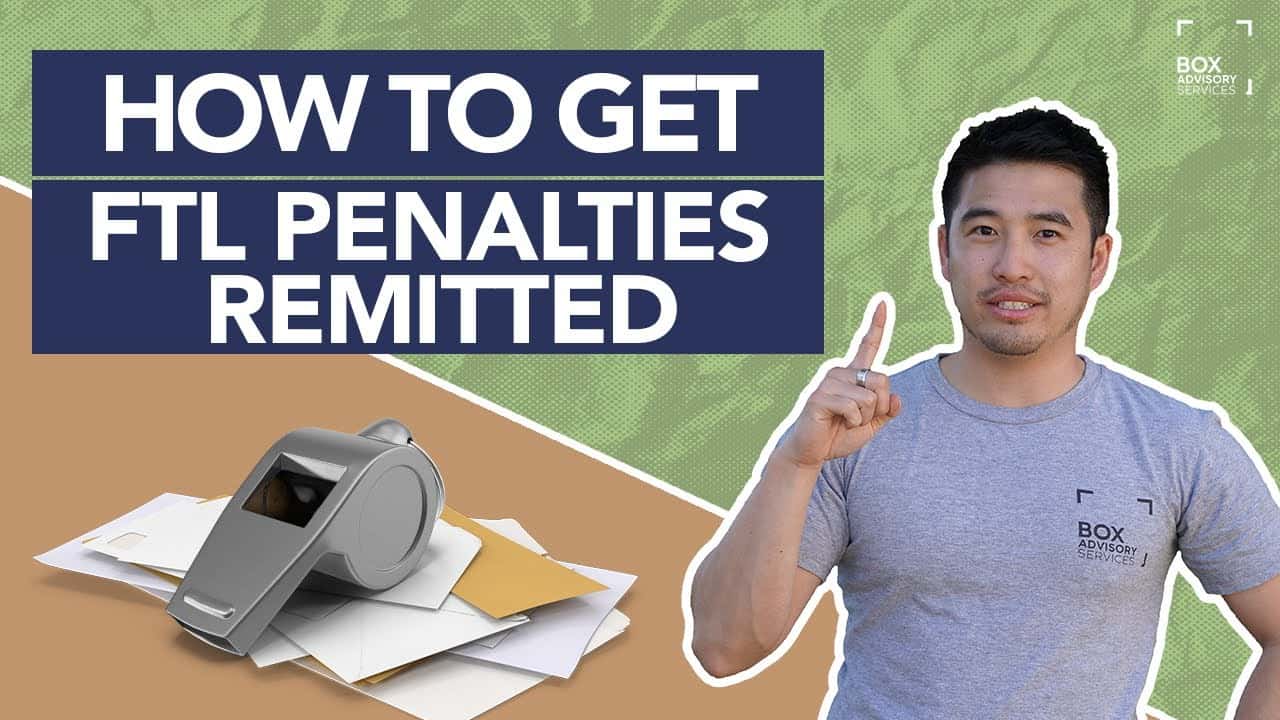
4 Steps To Remit Your Failure To Lodge Penalties
Failure to lodge penalties are enforced by the ATO when businesses are not meeting their reporting obligations. If you have received such a penalty, don’t despair just yet. In this article, we explain exactly how you can have this remitted.
How Much is the Failure to Lodge Penalty?
For small business entities, the failure to lodge penalty is calculated based on a rate of one “penalty unit” which constitutes 28 days (or part thereof), up to a maximum of five (5) penalty units.
Currently, any infringements that have occurred after 1 July 2017 attract a penalty amount of $210 per penalty unit.
This means you can potentially be expected to pay up to a maximum of $1,050 in penalties as well as interest charged on these fines.
Requesting Remission of your Failure To Lodge Penalty
If you have received a failure to lodge penalty notice, you can ask for it to be remitted in full or in part if the ATO considers your failure to be caused due to “extenuating” circumstance.
This is something that is generally interpreted on a discretionary basis by the ATO, but some examples may include natural disasters or severe illness.
Therefore, we recommend you think carefully about whether or not you fall under such a category before calling. If you have lodged false or misleading statements, we suggest you don’t bother.
For small businesses, the quickest way to request for remission is by phone on 13 28 65 for individuals and 13 72 26 for businesses. Before calling, ensure you read over the steps below to prepare for your phone call as you only get one shot at this.
Step 1 – Get All Your Lodgements & Payments Up To Date
Before you even call, we heavily recommend that you get everything up to date.
No point requesting a failure to lodge penalty remission with the ATO when after some further digging, they discover there are many more lodgements or tax obligations that you have failed to meet!
You want to give them no further excuses to decline your request or to issue you additional fines.
Step 2 – Provide Personal Details & Have Supporting Documents Ready
The ATO will always identify you to ensure that they are speaking to the correct person.
This means that they’ll be looking to verify you on the phone and will ask for your name, address, date of birth as well as some further supporting questions such as details from a previous letter you may have received from the tax office.
Once they’ve established this, provide them with the failure to lodge penalty details so that they can look this up within their database to ensure that both parties are dealing with the same issue.
You might also be interested in our article: 9 Business Registrations Your Businesses Needs
Step 3 – Explain Your Case & Why They Should Remit Your Failure To Lodge Penalty
In our experience, while the tax office is generally quite generous with remissions, they’re not handing these out like candy.
A legitimate reason for requesting a remission of your failure to lodge penalty is critical in ensuring that they honour your request.
A lot of our clients have encountered issues with their accountant, processes, software or have fallen into severe illness over an extended period.
You must find a way to prove to them (honestly) that you had not purposely failed to meet your obligations simply because you couldn’t be bothered or actively disregarded doing it.
Safe Harbour provisions can also apply if you have an accountant or registered tax/BAS agent if the following two conditions apply:
- You can prove that you provided the agent with all relevant tax information to allow them to lodge the return or statement by the due date
- The agent’s failure to lodge the return or statement was not reckless or intentionally disregarding the law
Regardless of what the reason may be, the most important thing to emphasise is that you have taken steps to ensure that this mistake will not happen again.
Whether this is hiring a new accountant, set up a payment arrangement or revised your processes, ensure that you are outlining this to the tax office representative at the time on the phone. Once you’ve explained your situation, you should request for leniency in your fines and interest charged.
Step 4 – Wait for a Decision
If your request is reasonable, then it’s incredibly likely that you will receive a remission on your failure to lodge penalty.
Even if you have paid the penalty and interest charged, a refund can be made if the decision is in your favour, usually in the form of a cheque.
Key Takeaways
It’s important to understand that this advice is recommended if you have honestly failed to make a lodgement or return due to circumstances that are not intentional and in disregard of the law.
For first time offenders, a certain degree of leniency is offered, but repeat offences are not looked upon favourably.
Therefore, it’s important to stress that you have the right systems and processes in place to ensure that you are not missing any of these deadlines again. A repeat offence is very unlikely to result in another remission.
To find out more, visit the ATO website.
If your circumstances are unique or you aren’t confident in doing this, we recommend you engage a qualified accountant to do this on your behalf. Box Advisory Services’ accountants can help with evaluating your situation and giving you the right advice to ensure the best possible outcome. Book an appointment with us today to find out more.
Sign up to our monthly newsletter where we share exclusive small business and contractor advice!
Disclaimer:
Please note that every effort has been made to ensure that the information provided in this guide is accurate. You should note, however, that the information is intended as a guide only, providing an overview of general information available to contractors and small businesses. This guide is not intended to be an exhaustive source of information and should not be seen to constitute legal or tax advice. You should, where necessary, seek a second professional opinion for any legal or tax issues raised in your business affairs.




